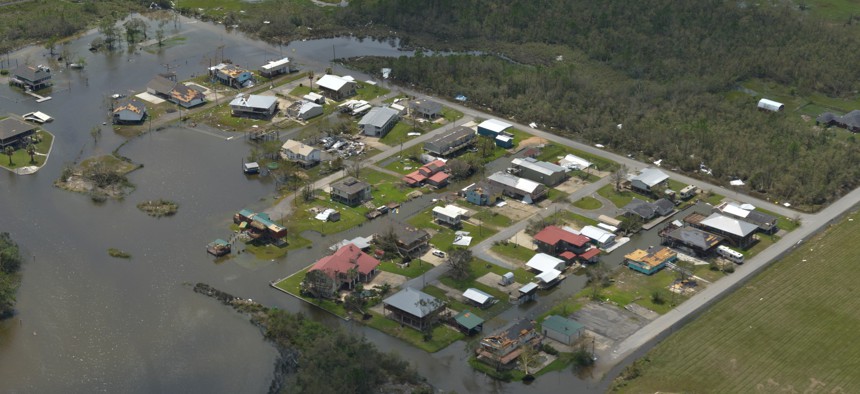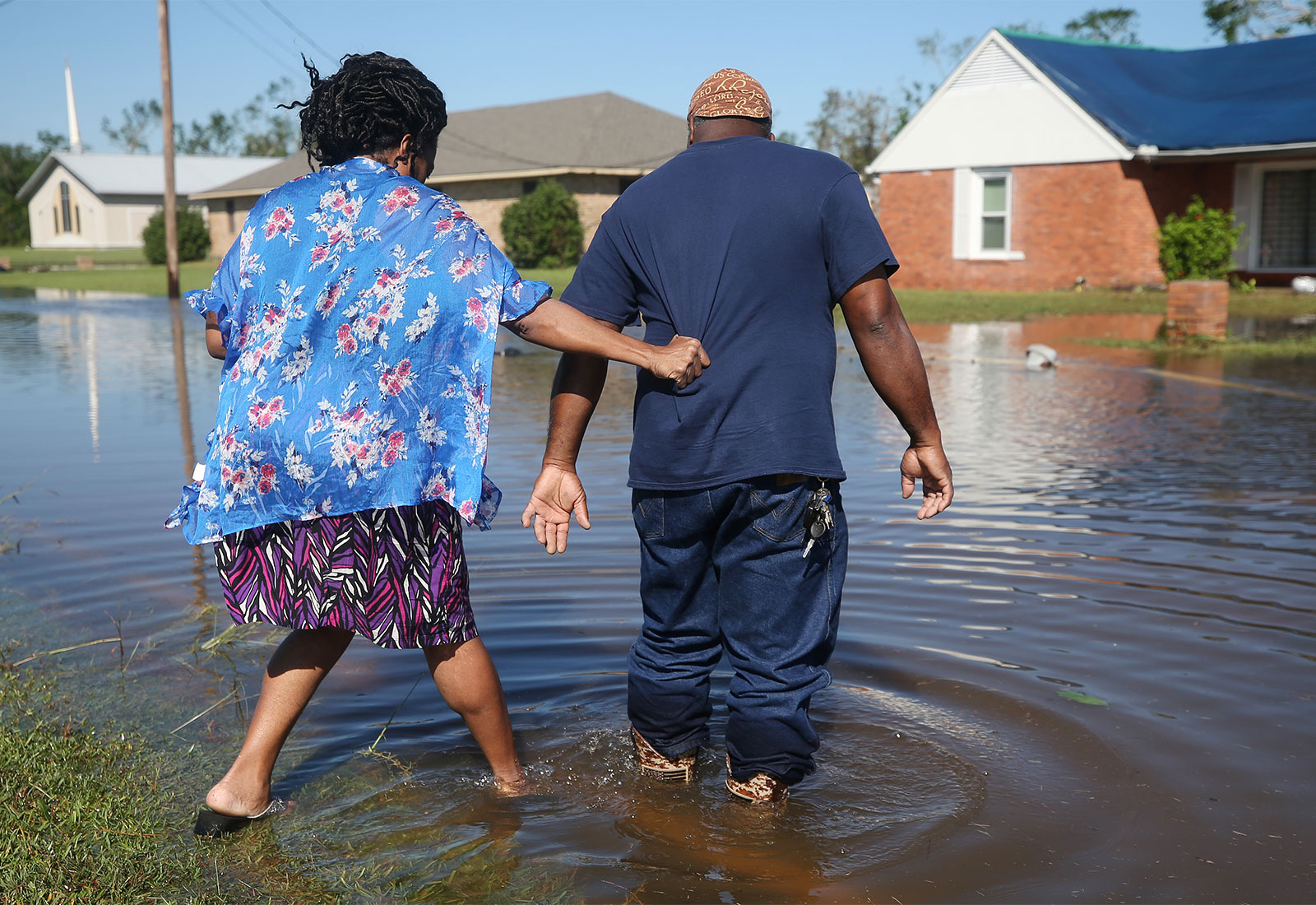
Petty Officer 3rd Class Sydney Phoenix / Coast Guard
How the U.S. Government Left Lake Charles in Limbo after Hurricanes Laura and Delta
The Louisiana city’s stalled hurricane recovery reveals the limits of federal disaster policy.
Eighteen months after Hurricane Laura, the streets of downtown Lake Charles remain eerily quiet. When Tasha Guidry drives to work at her office on Ryan Street, she passes houses with blue tarps still stretched over their roofs, decaying buildings that will soon be torn down, and restaurants that open for a few hours a day, if at all.
“We’re still where we were two years ago,” said Guidry, who helps connect area residents with legal services and housing. “Nothing has changed. We’re at a state of emergency.”
The Louisiana city of 85,000 has been hit by four major disasters in the last two years: The double-whammy of Hurricanes Laura and Delta in the summer of 2020 was followed by a deadly ice storm that winter, plus another devastating flood last spring. Climate change has not only made extreme weather events like these more severe and less predictable, but it has also eroded the marshland barrier that once protected coastal Louisiana from storms as they made landfall.
More than a year later, the region has now received an unexpected deluge of federal relief. Late last month, the Department of Housing and Urban Development, or HUD, announced that it will send $1.7 billion in extra hurricane relief money to Louisiana; around $450 million will go to Lake Charles to fund long-term housing repairs. That’s enough to put a significant dent in the $3 billion of unmet needs that Governor John Bel Edwards has said remain from the 2020 storms. The money represents an unexpected boost for the ailing region, whose population has declined by at least 5 percent since Laura — one of the fastest rates in the nation.
However, the late arrival of this money also highlights the limitations of the federal disaster relief system. Because funding depends on the whims of a gridlocked Congress, it often arrives after many people have already been forced to leave their homes for good.
In the immediate aftermath of a major disaster like a hurricane, the Federal Emergency Management Agency, or FEMA, arrives on the scene to distribute aid money to victims. FEMA distributes this money out of a multi-billion-dollar pot that it can use for whatever disasters happen in a given year, and most of it helps pay out people who’ve lost their homes or their belongings. The agency spent about $1 billion on the immediate recovery from Laura, which caused around $19 billion in total damages.

Because most of this money is targeted to individuals and families, though, it’s seldom enough to help a community achieve a full recovery, regaining its pre-disaster population and restoring businesses and organizations that shuttered after the storm. In the case of Lake Charles, the agency’s individual assistance payouts weren’t enough to fill a gaping hole in the city’s housing stock: The storm damaged about half the structures in the surrounding parish, and more homes fell to the subsequent disasters the following year. Even insured homeowners struggled to fund the full cost of repairs from back-to-back disasters, and many renters suddenly found themselves priced out of a city where thousands of housing units disappeared, turning what had been a soft rental market into a costly free-for-all. Many in both camps elected to leave Lake Charles altogether for larger cities like Houston and Dallas, Texas, where their temporary assistance from FEMA could be spent on more affordable housing.
“They can’t wait for relief, they can’t wait for housing,” Guidry told Grist. “They need a sense of normalcy.”
The housing crisis in Lake Charles, which is roughly 50 percent Black, has kicked off a vicious cycle of disinvestment and depopulation, leaving the city unable to gather the momentum it needs to recover. More than 300 commercial buildings have been condemned since Laura, and many streets on the city’s historically Black north side are still roughshod and covered with potholes.
This is where Congress comes in, at least in theory. Lawmakers often approve supplemental aid for major disasters, in part because FEMA lacks the resources to help communities rebuild over the long term. This money is pocket change compared to the overall size of the federal budget, but its distribution depends on the whims of various lawmakers. Since Congress passes so few standalone bills, legislators must jockey for their local priorities to be included in massive spending packages, which means that lobbying and media attention can make all the difference. In late 2020, amid a devastating pandemic and a contentious presidential election, the voices of Lake Charles’ victims got drowned out amid the din.
It ended up taking lawmakers over a year to pass additional aid. In September, Congress passed a bill that allocated $5 billion to HUD’s Community Development Block Grant Disaster Recovery program, which is meant to help with long-term rebuilding efforts. This bill was supposed to fund recovery from disasters that took place around the country in both 2020 and 2021.
Unlike FEMA funding, however, HUD’s disaster recovery program does not have permanent statutory authorization, meaning the agency has to start a lengthy bureaucratic process from scratch every time Congress authorizes it to spend money on disasters, rather than cutting checks right away. Because of this, it took another four months for HUD to announce how much money it would ultimately distribute and to issue guidance for how states could use that money.

The $600 million that Louisiana ended up with was far less than local officials wanted. For the rest of the autumn and winter, both of Louisiana’s Republican senators fought to secure more relief money, but their efforts couldn’t overcome congressional gridlock: At one point Kentucky Senator Rand Paul, a fellow Republican, blocked the passage of a standalone aid bill. The Louisiana delegation then hoped the money might appear in the massive omnibus spending bill negotiators hammered out last month, but it didn’t.
To lawmakers’ surprise, however, HUD was still sitting on substantial funds from the aid bill Congress passed in September, due to a communication breakdown between the housing department and FEMA. When that bureaucratic snafu was resolved, a $450 million windfall suddenly appeared for Lake Charles. The city’s mayor, Nic Hunter, said in a press release that the money meant that the city had finally “achieved an equitable response” to the chain of disasters.
Nevertheless, the new money arrives after 18 months of uncertainty and delay — and will likely reach the pockets of Lake Charles residents almost two years after Laura. That’s in part because Congress has never outlined a coherent policy for long-term disaster recovery. Without such a policy, residents of disaster-prone areas are more likely to pick up and move on, leaving hard-hit areas in cycles of economic and demographic decline.
“It’s too late to get those residents back,” said Guidry. “They haven’t been here in two years; they’re not coming back. So all we can do is work to get new people in and make it attractive for them to stay.”
Meanwhile, the housing crisis in Lake Charles is only getting worse. This month, FEMA will stop distributing temporary housing stipends to victims who lost their homes due to Hurricane Laura. This is standard procedure for the agency, which only doles out such payments for 18 months, but it rests on the assumption that a community will have made at least a partial recovery by the time the payments stop coming. In Lake Charles, that hasn’t happened.
Last month, meanwhile, the city moved to demolish a public housing development that had been damaged during the storm, forcing residents to vacate their homes. The city may yet repair or replace the homes, but in the meantime the displaced occupants are on their own. Guidry has been trying to help them find affordable housing, but only a few major apartment complexes have come back online since the storm, and the rental market in the area is still tighter than it’s ever been.
That might not be the case in a year: Once the new federal funding arrives, more shovels should start hitting the dirt, and the region’s housing stock should start to rebound. For the moment, though, the residents have nowhere to go — and every day of delay only makes the problem worse.
“This should really be so turnkey at this point,” said Alexis Merdjanoff, a professor of public health at New York University who has studied the long-term impact of disasters. “People are suffering, and these are not unique events. It should be really seamless for the government at any level — whether it’s federal, state or local — to release funds to help people.”
This story was originally published by Grist. You can subscribe to its weekly newsletter here.






